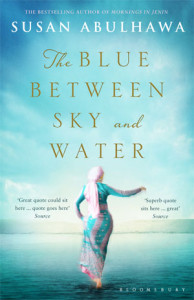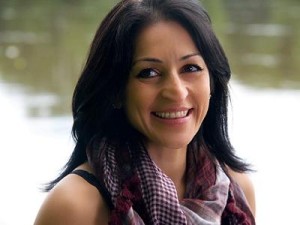Susan Abulhawa, “The Blue between Sky and Water”
 The Blue Between Sky and Water was my first introduction to Susan Abulhawa’s writing. It is about four generations of a family but focuses primarily on Nur a descendant born and brought up in American but moves to Palestine on work/love and ultimately settles there. At so many levels I enjoyed the novel. I liked it sweeping across generations while mapping the history of Palestine (as modern people know it to be), from the 1940s. This novel has a very strong sense of history to the present day of horrific living conditions, camps, ghettos, food tunnels, unnecessary violence and rape. To be put together in one place ostensibly as fiction but embedded in hard facts is what makes it so astounding. Accessing information ( most of it disturbing) about Palestine is fairly easily got on the Internet today — the frisking and innumerable checkpoints at the border, visiting Palestine by applying for a visa application at the Israeli embassy etc. In fact a few days ago I came across wearenotnumbers.org and discovered that Susan Abulhawa is a mentor in the programme. Till then I had heard of the food tunnels but to read a story about a runner in it who then lost his job came home very sharply to me when I began reading The Blue Between Sky and Water . So to get a novel that puts it all in one place is fascinating. It makes the ground reality accessible to a far wider circle than speaking only to the converted. Using the technique of telling a story of four generations of women is a trope familiar to contemporary fiction. It is useful since it is familiar to most contemporary readers so they are lulled into a comfort zone. Plus focusing on women/ communal matriarch structures that seem to operate in the camps, gives the novelist ample opportunity to be relaxed, comment, observe and analyse frankly and in a matter-of-fact manner. The observation about women and their relationships is fascinating. I read about these all the time and yet this is a favourite passage of mine in the book about the relationship between the social worker Nzinga responsible for looking after Nur when she was in foster care and Nur. “…the thing between them remained. It changed as they needed it to. Its parts were made of motherhood, sisterhood, womanhood, comradeship in struggle, political activism, mentorship, friendship.” (p. 163) Or the beekeeper’s widow who inspired other women to invest in themselves and their dwellings.
The Blue Between Sky and Water was my first introduction to Susan Abulhawa’s writing. It is about four generations of a family but focuses primarily on Nur a descendant born and brought up in American but moves to Palestine on work/love and ultimately settles there. At so many levels I enjoyed the novel. I liked it sweeping across generations while mapping the history of Palestine (as modern people know it to be), from the 1940s. This novel has a very strong sense of history to the present day of horrific living conditions, camps, ghettos, food tunnels, unnecessary violence and rape. To be put together in one place ostensibly as fiction but embedded in hard facts is what makes it so astounding. Accessing information ( most of it disturbing) about Palestine is fairly easily got on the Internet today — the frisking and innumerable checkpoints at the border, visiting Palestine by applying for a visa application at the Israeli embassy etc. In fact a few days ago I came across wearenotnumbers.org and discovered that Susan Abulhawa is a mentor in the programme. Till then I had heard of the food tunnels but to read a story about a runner in it who then lost his job came home very sharply to me when I began reading The Blue Between Sky and Water . So to get a novel that puts it all in one place is fascinating. It makes the ground reality accessible to a far wider circle than speaking only to the converted. Using the technique of telling a story of four generations of women is a trope familiar to contemporary fiction. It is useful since it is familiar to most contemporary readers so they are lulled into a comfort zone. Plus focusing on women/ communal matriarch structures that seem to operate in the camps, gives the novelist ample opportunity to be relaxed, comment, observe and analyse frankly and in a matter-of-fact manner. The observation about women and their relationships is fascinating. I read about these all the time and yet this is a favourite passage of mine in the book about the relationship between the social worker Nzinga responsible for looking after Nur when she was in foster care and Nur. “…the thing between them remained. It changed as they needed it to. Its parts were made of motherhood, sisterhood, womanhood, comradeship in struggle, political activism, mentorship, friendship.” (p. 163) Or the beekeeper’s widow who inspired other women to invest in themselves and their dwellings.
The creation of Khaled too fascinated me. The evolution from an imaginary friend to a son of the family who is then trapped in his body, so in a sense remains the observer/ non -participant he was at the very outset of the story. It gives a perspective to the story which would not be easy to introduce. Being his voice could not have been an easy literary technique to create as well.
Creating a piece of fiction about a relentless, unforgiving and senseless conflict could not have been easy for the author. Where do you start? Where do you end? So to see a neat dip into a slice of history without losing focus of the horrors of violence is probably what kept me spellbound.
In India, we have writers and readers obsessed with commemorating Partition through literature which throws up another series of questions since it is a violent moment from our past. But an emerging trend is to have writers commentating about places of “conflict” that exist in our country. Where it will take us I have no idea. A few days ago I was watching Ta-Nehisi Coates interview on The Daily Show. Many of the issues he raises in the conversation about violence, hatred, racism etc could be about any other land as well. Have you seen it? http://thedailyshow.cc.com/extended-interviews/sx47nw/exclusive-ta-nehisi-coates-extended-interview?utm=share_twitter Author and legal advocate Bryan Stevenson’s moving acceptance speech for Carnegie Medal in nonfiction for Just Mercy: A Story of Justice and Redemption (Spiegel & Grau) makes the valid point that “literature has the ability to accomplish a narrative shift”. ( http://www.publishersweekly.com/pw/by-topic/industry-news/awards-and-prizes/article/67546-is-this-the-greatest-book-award-acceptance-speech-ever.html ) Such writing is embedded deeply in the politics of the land and has to be but in The Blue Between Sky and Water the precision with which it comes across is so sharp. Even a first time comer to the conflict of Israel and Palestine will get a good sense of the troubles that ail the region.
I discussed Susan’s novel with her via email. We exchanged emails furiously. But here is a snippet from our correspondence that encapsulates the essence of such fiction. This quote is being shared with the author’s permission. “…Maya Angelou once said: ‘there is no greater agony than bearing an untold story inside you’. I understand well how a collective trauma – Slavery, genocide, Nakba, Partition, etc. – can become a nation’s center of gravity, around and from which stories go and return. I believe that’s true in part because one’s greatest wound is often one’s greatest source of strength and power. I believe it’s why we become protective of everything cultural that belongs to that wound; why cultural appropriation, and narrative appropriation are such important issues relating to identity politics.”
Susan Abulhawa will be participating in literary festivals in 2015-16 in the Indian subcontinent — Jaipur Literature  Festival, The Times of India LitFest, Hindu Lit for Life festival (Chennai), and Lahore. Here is an interview with the author from 2012 by the absolutely wonderful Marcia Lynx Qualey, Editor of Arabic Literature ( in English) http://www.full-stop.net/2012/04/16/interviews/marcia-lynx-qualey/susan-abulhawa/ .
Festival, The Times of India LitFest, Hindu Lit for Life festival (Chennai), and Lahore. Here is an interview with the author from 2012 by the absolutely wonderful Marcia Lynx Qualey, Editor of Arabic Literature ( in English) http://www.full-stop.net/2012/04/16/interviews/marcia-lynx-qualey/susan-abulhawa/ .
The Blue Between Sky and Water is a shatteringly astounding novel. It is a must read.
Susan Abulhawa The Blue Between Sky and Water Bloomsbury Circus, London, London, 2015. Pb. pp. 292 Rs 499
28 July 2015

No Comments